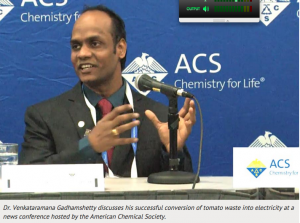Researchers from South Dakota School of Mines & Technology have developed a way to convert tomato waste in electricity. Led by Venkataramana Gadhamshetty, Ph.D., he and his team used a biological-based fuel cell that uses tomato waste left over from harvests in Florida. The characteristics of the decomposing waste make it a “perfect fuel source” for enhancing electrochemical reactions, Gadhamshetty said.
Food waste comes in many forms including the leftovers of manufacturing processes of sauces, ketchup and other cooking products. He began the research several years ago as a professor at Florida Gulf Coast University. He says the project is important to Florida, where tomatoes are a key crop, because the state generates 396,000 tons of tomato waste every year but lacks a good treatment process. Gadhamshetty said a lot of this waste is ripe with chemical energy and he and his team wanted to see if this could be used as a source of electrons. The answer: yes.
The team tested the defective tomatoes in a new electrochemical device built at the South Dakota Mines campus, which degrades tomato waste and then extracts electrons. The power output from their mini reactor is small: 10 milligrams of tomato waste can result in 0.3 watts of electricity. But the researchers note that with an expected scale up and more research, electrical output could be increased by several orders of magnitude.
 “It might be possible to one day put this device at the bottom of my kitchen sink” to convert waste into household electricity, Gadhamshetty said who added that this alternative fuel source is inexpensive technology because operations can be conducted at room temperature requiring no major investment of materials.
“It might be possible to one day put this device at the bottom of my kitchen sink” to convert waste into household electricity, Gadhamshetty said who added that this alternative fuel source is inexpensive technology because operations can be conducted at room temperature requiring no major investment of materials.
Gadhamshetty and SD Mines graduate student Namita Shrestha are collaborating on the project with Alex Fogg, an undergraduate chemistry major at Princeton University. Other project collaborators include Daniel Franco, Joseph Wilder and Simeon Komisar, Ph.D., at Florida Gulf Coast University.
“I’m really excited about this research. I come from a small country, Nepal, and we have power cut off as much as 20 hours in a day, so this could really help developing countries,” Shrestha said. “We cannot afford expensive technologies like waste treatment.” According to Shrestha’s calculations, there is theoretically enough tomato waste generated in Florida each year to meet Disney World’s electricity demand for 90 days, using an optimized biological fuel cell.









